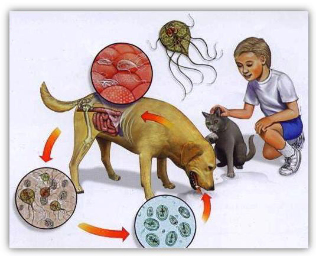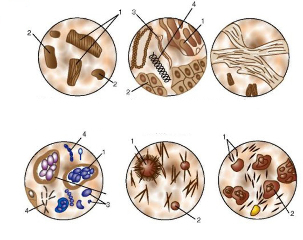Parasites are microorganisms that survive by eating on host organisms. Living in the human body, they cause serious health problems and due to their reproduction they can be fatal.
Parasites are usually classified into two categories:
- Plant-eating animals, including parasitic worms (helminths, flatworms), spiders, ticks, mollusks, etc. v.
- Phytoparasites are parasitic plants, viruses, pathogenic fungi, etc. v.
In addition, some viruses, which lead a parasitic lifestyle at the expense of a strange organism, can be classified as parasites.
Unfortunately, even modern society cannot completely protect itself from parasitic infections, but if you conduct parasitic analysis in time, you can avoid reproductionand their elimination without causing serious harm to your health.
Symptoms indicating the presence of the parasite in the human body
The penetration of a parasite into a human body occurs through natural gates such as the mouth, genitals and anus. Less often, the helminths get into the skin, genital system, or ears.
Pathogens can be transmitted through food and water (most types of helminths), through physical contact with an infected person (pinworms), through soil, air, or dust. (roundworm).
Usually, invasive diseases have no symptoms, do not show their presence to me. But with overproduction, signs of various diseases appear, often do not indicate the presence of the parasite, which significantly complicates the treatment due to the inability to make an accurate diagnosis.
However, there are some signs that one might think that the parasite exists in the human body.
Among them:
- frequent headache;
- frequent joint pain;
- irrational muscle pain;
- frequent colds; allergic skin rash
- ;
- dyspepsia and constipation;
- clenched her teeth while sleeping;
- low efficiency, constant fatigue;
- increased suspense;
- insomnia;
- cracked heels;
- difficulty breathing;
- disrupts the digestive tract;
- strong fluctuations in weight;
- fragility of nail sheets;
- itching in the anus.
Tumors
Be aware that parasitic diseases can cause serious problems. For example, a large number of helminths can recombine and cause intestinal obstruction.
The parasite can also cause chronic cell damage, cancer, anemia, or jaundice.
Signs of parasites in children

Symptoms for identifying the presence of parasitic organisms in children:
- violation of a normal diet (anorexia, gluttony);
- increases in body temperature; allergic rash
- ;
- moody, depressed, anxious;
- dark circles under the eyes; Pale
- of the skin;
- bowel problems (diarrhea with mucus or constipation);
- nausea and vomiting mainly in the morning.
Most parasites cannot leave the human body on their own. So, if at least one of the above symptoms manifests, it is essential to contact a local specialist or pediatrician, to go for parasitic testing and treatment for helminths.
Diagnosis of invasive diseases
Diagnosis of invasive diseases including the detection of parasites (pinworms, amoebas) and their reproductive products (larvae, eggs). A blood, stool, curettage or sputum test is indicated first. To study samples, do:
- histological examination; immunological research
- ;
- blood macro photography;
- tests for plant magnetic resonance.
Checking for the presence of parasites in children

Before seeing a specialist, parents often wonder what tests need to be done to identify the parasite in the child and which method gives more accurate results. An analysis for invasive diseases in children is prescribed based on the location and type of parasite.
Most commonly specified:
- blood test by ELISA;
- serological test;
- scrape or apply by PCR method;
- blood test in adults and children.
A blood test is the most effective type of study and allows you to accurately identify the picture of the disease, the type of worms, as well as fertility. It allows you to identify the presence of roundworm, toxoplasma, cysticercosis, amoeba and lichen.
One such type of study is the ELISA blood test, which allows you to evaluate the content of certain antibodies in the blood plasma, which helps you to identify the stage of infection, study the immune response of the muscle. and allows you to identify specific factors in the bloodstream.
Advantages of the ELISA study:
- accuracy of results, regardless of laboratory assistant's qualifications and experience;
- high analytical sensitivity, accuracy up to 90%;
- allows you to display a complete picture of the disease and the number of parasites; The
- parasite is diagnosed at an early stage of development;
- ability to track disease dynamics;
- determines the presence of toxic products in the blood.
When interpreting the results, the color of the reagent and the intensity of the sample shade are taken into account. The ratio of antibodies to parasitic antigens is measured by the concentration of markers IgM and IgG in the blood. High IgM and IgG concentrations were maintained during helminths.
If the blood test shows high IgM levels then the disease is acute. IgG antibodies represent a chronic form of the disease.
Disadvantages of a blood test to diagnose parasitic diseases:
- ELISA
- blood test results were received within 7 days, while scrapes, smears and feces samples were taken after 1-2 days;
- research must be done in a special laboratory for a fee.
Should donate blood on an empty stomach, mainly the first half day, should not take the drug 12-15 hours before taking blood. Parents should prepare their children in advance.
Analytical analysis

Microscopic analysis may be required to pre-identify helminths in the traditional way. During the study, the presence of parasitic eggs in a fecal fragment is identified.
The most accurate result is the one shown in the 3 tests of the week.
For the most accurate results, a piece of stool must be sent to the laboratory for examination no later than 45 minutes after the bowel movement.
During the research, parasites like:
- Tapeworm
- ; subject
- ;
- nematodes.
This kind of diagnosis, quite easily, cannot be claimed to be 100% correct. This is because parasites that live in the human body may not lay eggs for a long time.





























